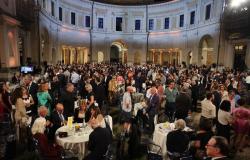It’s always a special experience to read a friend’s novel. Because inevitably you find in the words, in the stories, in the characters, in the emotions told some traces, some seeds, some fragments of the person behind all this. In Odd Sisters of the Lucy Espositoa companion in our adventures in the beginning of our careers as journalists and then a friend for over 20 years, I found a lot of her. Her way of being, of living, of living her profession, but above all the bonds, those that she has stubbornly preserved despite a profession that tends (or demands) a lot of exclusivity.
In Mismatched Sisters there is the Lucia linked to the family, the Lucia linked to friendships, to her Naples, but above all there is the Lucia who has chosen to live the profession in her own way, refusing to listen to the advice of a Neapolitan editor-in-chief who is beginning of the book: “To stay on the road you have to leave your heart at home, baby”. Where the road is the one a reporter must travel to do her job. Lucia has been a reporter for most of her career but – like her alter ego protagonist in the book, Viola – ‘o core he never left it at home.
His inexhaustible curiosity for others never turned into cynicism, his desire to tell stories never became the search for the “cute”, the “sensational” (in the novel there are various sacrosanct criticisms of this way of understanding and to make newspapers). This book is the result of his approach to the stories and lives of others.
The one around which the novel revolves is a story she came across as a young reporter, a very harsh story, of a young Albanian prostitute, Ershela, kidnapped, enslaved and taken to the pavements of Italy to sink into the abyss, end of the 90s. It is the story of Ershela told by herself, through the letters she wrote to her sister Alina, without ever sending them to her. But it is also the story of Viola, who at a certain moment comes into possession of those letters.
Lucia tells the parallel lives of these two women, she does so dominated by a feeling of pietas that is precisely the key to the novel. That pietas that perhaps, in her work as a reporter, she has had to silence too many times (because as she herself tells in the book through the character of Viola, it is not pietas that journalism feeds on, but scoops and strong sensations) and to which she gives free rein through this novel.
It is as if Lucia, through Viola, wanted to do what is almost never done when reporting on news: to try to tell what is behind the victims, even the most invisible ones, the most marginal ones: immense riches of life, of experiences, of feelings, of strength, of inexhaustible love, like the one that binds Ershela to her sister Alina.
Lucia – who like Viola came into possession of them – kept those letters for 28 years. Today you have made it into a book, a novel, not an essay or a reportage. This is because-as you say Javier Cercasgreat Spanish writer, master at mixing reality and fiction in his novels – ”certain truths can only be reached through fiction, and one of them is literary fiction”. The literary truth of “Sorelle Spaiate” is a journey into the underworld of exploitation, but also of resilience, it is a tribute to the strength of women, a slap in the face to the meanness of men. It’s much more: it’s the story of the difficulties of love, that between sisters, that between lovers. It is the story of how those who live in the privilege of a comfortable and trauma-free life often build walls with the people closest to them. It is a sentimental journey, not a cold news story, a journey in which feelings reign supreme, almost in an immodest way. It is precisely the novel of a slightly grown up little girl who she refuses to leave at home ‘o core. Fortunately.






